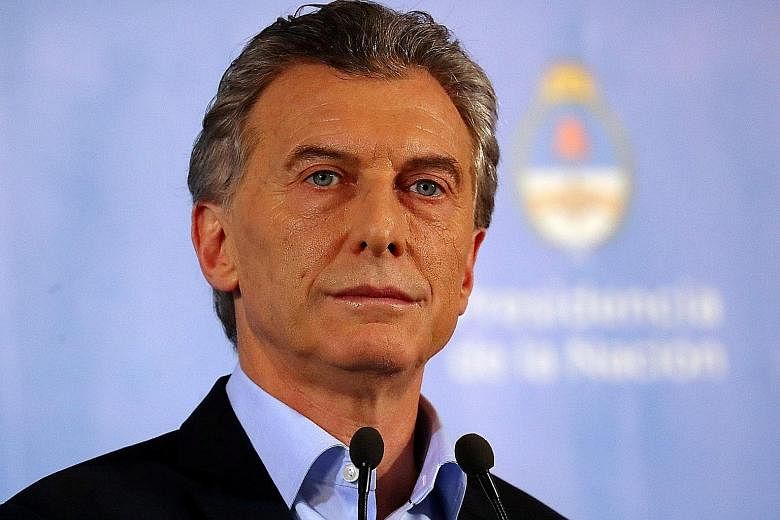BUENOS AIRES • Argentina's President Mauricio Macri announced austerity measures yesterday, including the elimination of government ministries and stiff taxes on exports, to reduce budget deficits and stabilise the economy.
The centre-right President admitted in a speech to the coun-try that Argentina was facing "an emergency".
"We must confront a fundamental problem: to not spend more than we have, to make efforts to balance the state's accounts," he said in the televised address.
Argentina is one of the world's biggest exporters of corn and soya bean oil. Addressing rich agricultural exporters who will face export taxes, he said: "We know it is a bad tax, but I ask you to understand that it is an emergency."
In a bid to reassure Argentinians increasingly concerned over austerity, he said he would allocate more aid to the country's poor, suffering from the effects of high inflation.
"We will overcome the crisis by taking care of the most needy," he said, promising "increased allocations, food programmes and price caps on some commodities."
Argentina will also eliminate about half of the current Cabinet ministries to reduce spending, Mr Macri said.
Treasury Minister Nicolas Dujovne said at a press conference after Mr Macri spoke that the government will target balancing its budget next year - a year earlier than planned - and seek a surplus in 2020.
Mr Dujovne said that mistakes had been made in managing the economy, and announced measures to cut the budget deficit to 1.3 per cent of gross domestic product next year. He was speaking before flying to Washington for a meeting with the International Monetary Fund (IMF) today to finalise a deal to speed up disbursement of a US$50 billion (S$68.6 billion) loan agreed in June.
Crippling inflation, one of the country's worst droughts in years and the world's highest interest rate are holding back the economy, which is set to enter its second recession in three years.
The announcement also follows one of Argentina's most turbulent weeks in recent memory. The peso fell 16 per cent after Mr Macri made the surprise request last Wednesday to seek faster payments from the IMF. The central bank sold reserves and hiked its key interest rate up to 60 per cent from 45 per cent.
"This is good news because now the bar has been set to achieve fiscal balance in 2019 and a decent surplus in 2020," said Mr Walter Stoeppelwerth, chief investment officer of Balanz Capital. But he said that Mr Macri's party "still does not have a spokesman who can generate confidence to the market".
Even before last week's sell-off, Argentina was having a rough year. After officials predicted strong growth and lower inflation at the beginning of the year, a mix of bad luck, vague communication and confusing policies put Argentina on track for a recession after the record drought curbed soya output and inflation crimped consumer demand.
Rising United States interest rates in April and an emerging market sell-off last month added to the peso's problems. August was the peso's worst month since the country's historic debt crisis in 2001.
Disjointed communication compounded the peso's pain. Mr Macri's request was not confirmed by the IMF for much of Wednesday until managing director Christine Lagarde said later in the day that she would review the stand-by agreement.
Mr Macri is in a pinch to please investors by cutting spending, while ensuring that the massive belt-tightening does not cause social upheaval ahead of next year's election.
AGENCE FRANCE-PRESSE, BLOOMBERG

